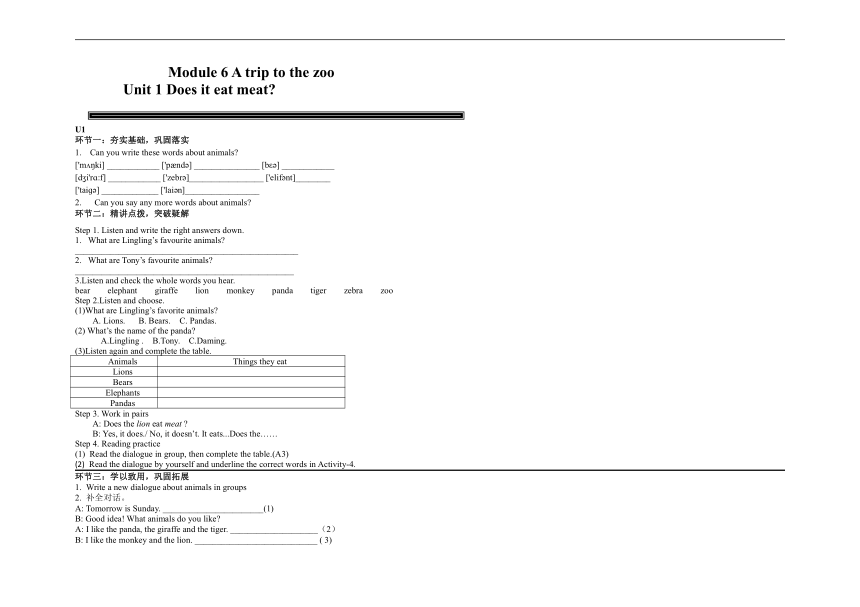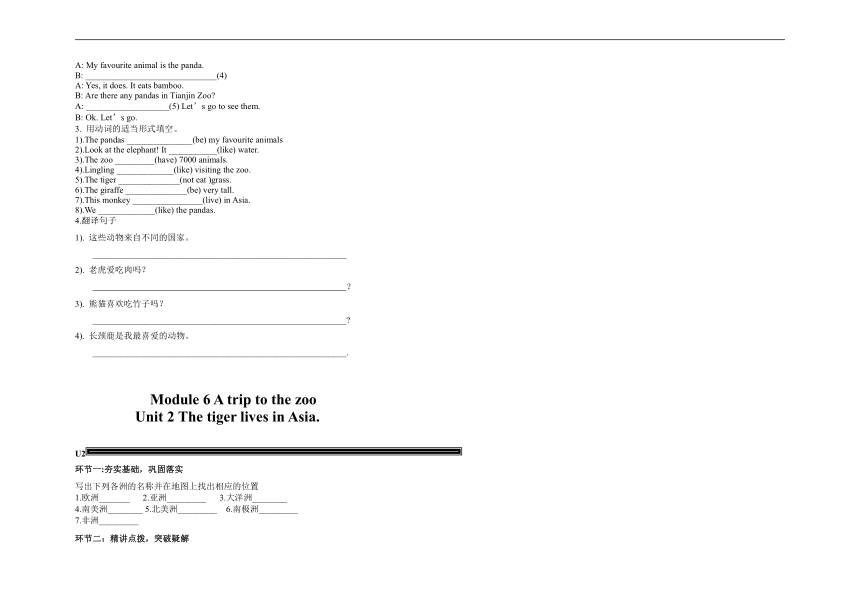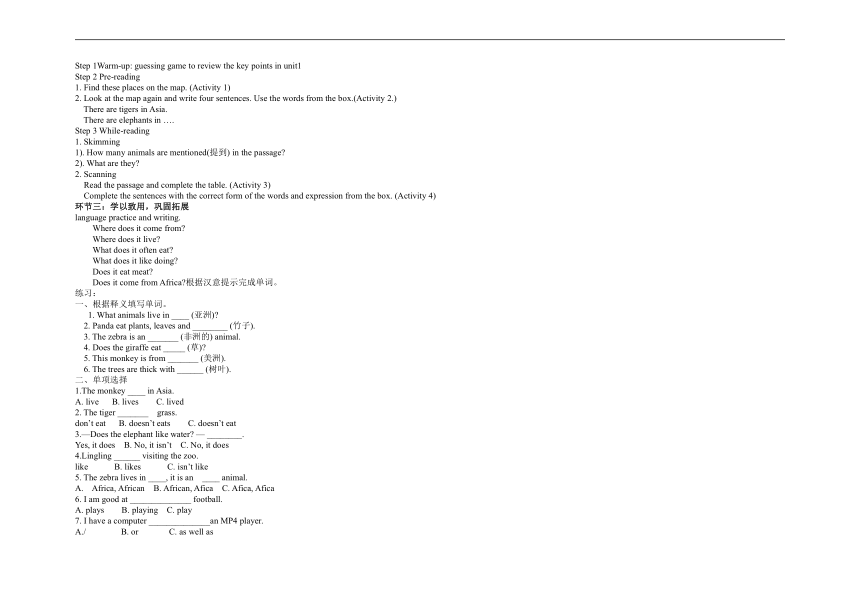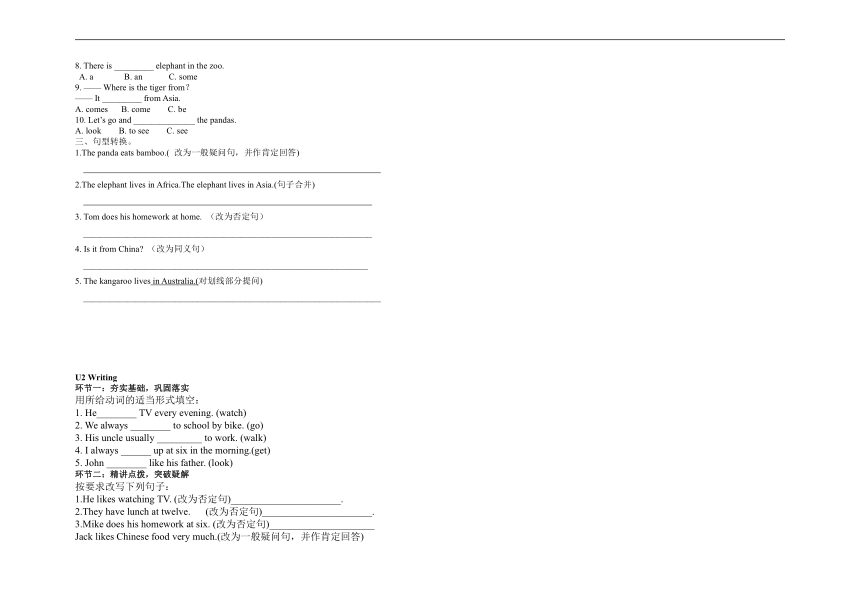外研版英语七年级上册 Module 6 A trip to the zoo 学案(无答案)
文档属性
| 名称 | 外研版英语七年级上册 Module 6 A trip to the zoo 学案(无答案) |  | |
| 格式 | docx | ||
| 文件大小 | 47.5KB | ||
| 资源类型 | 教案 | ||
| 版本资源 | 外研版 | ||
| 科目 | 英语 | ||
| 更新时间 | 2022-08-22 14:49:46 | ||
图片预览




文档简介
(
Module
6
A trip to the zoo
Unit 1
Does it eat meat
)
U1
环节一:夯实基础,巩固落实
Can you write these words about animals
['m ki] ____________ ['p nd ] _______________ [bε ] ____________
[d i'rɑ:f] ____________ ['zebr ]_________________ ['elif nt]________
['taiɡ ] _____________ ['lai n]_________________
Can you say any more words about animals
环节二:精讲点拨,突破疑解
Step 1. Listen and write the right answers down.
What are Lingling’s favourite animals
___________________________________________________
What are Tony’s favourite animals
__________________________________________________
3.Listen and check the whole words you hear.
bear elephant giraffe lion monkey panda tiger zebra zoo
Step 2.Listen and choose.
(1)What are Lingling’s favorite animals
A. Lions. B. Bears. C. Pandas.
(2) What’s the name of the panda
A.Lingling . B.Tony. C.Daming.
(3)Listen again and complete the table.
Animals Things they eat
Lions
Bears
Elephants
Pandas
Step 3. Work in pairs
A: Does the lion eat meat
B: Yes, it does./ No, it doesn’t. It eats...Does the……
Step 4. Reading practice
Read the dialogue in group, then complete the table.(A3)
Read the dialogue by yourself and underline the correct words in Activity-4.
环节三:学以致用,巩固拓展
Write a new dialogue about animals in groups
补全对话。
A: Tomorrow is Sunday. _______________________(1)
B: Good idea! What animals do you like
A: I like the panda, the giraffe and the tiger. ____________________(2)
B: I like the monkey and the lion. ____________________________ ( 3)
A: My favourite animal is the panda.
B: ______________________________(4)
A: Yes, it does. It eats bamboo.
B: Are there any pandas in Tianjin Zoo
A: ___________________(5) Let’s go to see them.
B: Ok. Let’s go.
用动词的适当形式填空。
1).The pandas _______________(be) my favourite animals
2).Look at the elephant! It ___________(like) water.
3).The zoo _________(have) 7000 animals.
4).Lingling _____________(like) visiting the zoo.
5).The tiger ______________(not eat )grass.
6).The giraffe ______________(be) very tall.
7).This monkey ________________(live) in Asia.
8).We _____________(like) the pandas.
4.翻译句子
1). 这些动物来自不同的国家。
__________________________________________________________
2). 老虎爱吃肉吗?
?
3). 熊猫喜欢吃竹子吗?
__________________________________________________________
4). 长颈鹿是我最喜爱的动物。
__________________________________________________________.
Module 6 A trip to the zoo
Unit 2 The tiger lives in Asia.
U2
环节一:夯实基础,巩固落实
写出下列各洲的名称并在地图上找出相应的位置
1.欧洲_______ 2.亚洲_________ 3.大洋洲________
4.南美洲________ 5.北美洲_________ 6.南极洲_________
7.非洲_________
环节二:精讲点拨,突破疑解
Step 1Warm-up: guessing game to review the key points in unit1
Step 2 Pre-reading
1. Find these places on the map. (Activity 1)
2. Look at the map again and write four sentences. Use the words from the box.(Activity 2.)
There are tigers in Asia.
There are elephants in ….
Step 3 While-reading
1. Skimming
1). How many animals are mentioned(提到) in the passage
2). What are they
2. Scanning
Read the passage and complete the table. (Activity 3)
Complete the sentences with the correct form of the words and expression from the box. (Activity 4)
环节三:学以致用,巩固拓展
language practice and writing.
Where does it come from
Where does it live
What does it often eat
What does it like doing
Does it eat meat
Does it come from Africa 根据汉意提示完成单词。
练习:
一、根据释义填写单词。
1. What animals live in ____ (亚洲)
2. Panda eat plants, leaves and ________ (竹子).
3. The zebra is an _______ (非洲的) animal.
4. Does the giraffe eat _____ (草)
5. This monkey is from _______ (美洲).
6. The trees are thick with ______ (树叶).
二、单项选择
1.The monkey ____ in Asia.
A. live B. lives C. lived
2. The tiger _______ grass.
don’t eat B. doesn’t eats C. doesn’t eat
3.—Does the elephant like water — ________.
Yes, it does B. No, it isn’t C. No, it does
4.Lingling ______ visiting the zoo.
like B. likes C. isn’t like
5. The zebra lives in ____, it is an ____ animal.
A. Africa, African B. African, Afica C. Afica, Afica
6. I am good at ______________ football.
A. plays B. playing C. play
7. I have a computer ______________an MP4 player.
A./ B. or C. as well as
8. There is _________ elephant in the zoo.
A. a B. an C. some
9. —— Where is the tiger from?
—— It _________ from Asia.
A. comes B. come C. be
10. Let’s go and ______________ the pandas.
A. look B. to see C. see
三、句型转换。
1.The panda eats bamboo.( 改为一般疑问句,并作肯定回答)
2.The elephant lives in Africa.The elephant lives in Asia.(句子合并)
3. Tom does his homework at home. (改为否定句)
__________________________________________________________________
4. Is it from China (改为同义句)
_________________________________________________________________
5. The kangaroo lives in Australia.(对划线部分提问)
____________________________________________________________________
U2 Writing
环节一:夯实基础,巩固落实
用所给动词的适当形式填空:
1. He________ TV every evening. (watch)
2. We always ________ to school by bike. (go)
3. His uncle usually _________ to work. (walk)
4. I always ______ up at six in the morning.(get)
5. John ________ like his father. (look)
环节二:精讲点拨,突破疑解
按要求改写下列句子:
1.He likes watching TV. (改为否定句)______________________.
2.They have lunch at twelve. (改为否定句)______________________.
3.Mike does his homework at six. (改为否定句)_____________________
Jack likes Chinese food very much.(改为一般疑问句,并作肯定回答)
_________________________________ ________, he _______.
He usually goes to school at 7:30. (改为一般疑问句,并作否定回答)
_________________________________ ______ , he ______.
环节三:学以致用,巩固拓展
一、写无定法,写必有法
◆五要素法介绍某一动物
1.开篇入题:多以 Welcome to...等句子开头;
2.介绍外貌:介绍动物形体、颜色、是否强壮等;
3.产地:介绍动物来自哪个大洲或国家;
4.饮食及生活习惯:介绍动物的日常饮食;
5.总结:总结全文,多以Have a good time.等句子结尾。
二、写作示例
假如周末你在动物园做义务导游,请根据提示,向外国朋友简单介绍一下动物园里的老虎。
产地:亚洲 饮食:肉
生活习惯:喜欢独居;喜欢水;擅长游泳。
写作要求:介绍要全面,从老虎的产地、饮食及生活习惯等几个方面来介绍,60词左右。
__________________________________________________________________________________________________________________________________________________________________________________________________________________________________________________________________________________________________________________________________________________________________________________________________________________________________________________________________________________________________________________________________________________________________________________________________________________________
Module 6 A trip to the zoo
Unit 3 Language in use
U3
环节一:夯实基础,巩固落实
按照所给词的正确形式填空.
1. Chen Jie sometimes _________(go)to the park with her sister.
2. Mike_________ (like) cooking.
3. They _________ (have) the same hobby.
4. My aunt _________ (look) after her baby carefully.
5. You always _________ (do) your homework well.
6. I _________ (be) ill. I’m staying in bed.
7. She _________ (go) to school from Monday to Friday.
8. Liu Tao _________ (do) not like PE.
9. The child often _________ (watch) TV in the evening.
10. Wang Kai and Wang li _________ (have) eight lessons this term.
11. -What day _________ (be) it today
-It’s Saturday.
环节二:精讲点拨,突破疑解
行为动词的一般现在时(二)
本模块的核心语法仍然是行为动词的一般现在时,但本模块侧重讲的是“主语是第三人称单数时的情形”。
1.当主语是第三人称单数时,在肯定句中要用动词的第三人称单数形式。
如:
He works for a TV station. 他为一家电视台工作。
拓展 动词第三人称单数的变化规律:
一般情况下,直接在动词词尾加-s work -works take takes
以s、x、sh、ch、o结尾的动词,在词尾加-es finish -finishes teach -teaches
以辅音字母+y结尾的动词,先把y变为i,再加-es study -studies fly -flies
其他 have -has be -is
例 My brother ______ the piano every day.
A.play B.plays C.is playing
解析 句意:我哥哥每天都弹钢琴。根据every day可知,时态是一般现在时,主语是
My brother,故所缺的词是plays。
2.句式变化
当主语是第三人称单数形式,时态是行为动词的一般现在时时的句式变化
肯定句 主语+动词第三人称单数形式+其他.
否定句 主语+doesn’t+动词原形+其他.
一般疑问句 主语+doesn’t+动词原形+其他.
肯定回答 Yes, 主语+does.
否定回答 No, 主语+doesn’t.
My uncle works in a factory. 我叔叔在一家工厂工作。
My uncle doesn’t work in a factory. 我叔叔不在一家工厂工作。
-Does your uncle work in a factory 你叔叔在一家工厂工作吗
-Yes, he does.是的,他在。/No, he doesn’t. 不,他不在。
例 按要求完成句子,每空一词
Lucy does her homework every afternoon. (改为一般疑问句)
______ Lucy ______ her homework every afternoon
解析 该句的主语是Lucy,时态是一般现在时,变一般疑问句时,要把助动词does提前;Lucy后要用动词does的原形,即do。
按照所给词的正确形式填空.
1. Chen Jie sometimes _________(go)to the park with her sister.
2. Mike_________ (like) cooking.
3. They _________ (have) the same hobby.
4. My aunt _________ (look) after her baby carefully.
5. You always _________ (do) your homework well.
6. I _________ (be) ill. I’m staying in bed.
7. She _________ (go) to school from Monday to Friday.
8. Liu Tao _________ (do) not like PE.
9. The child often _________ (watch) TV in the evening.
10. Wang Kai and Wang li _________ (have) eight lessons this term.
11. -What day _________ (be) it today
-It’s Saturday.
(
Reading
(
A
)
)环节三:学以致用,巩固拓展
Most cats like to catch mice and eat them. But this cat and this mouse got on well(相处得好). I will tell you why they were friends.
One day, the cat ran into a net (网) and could not get out of it. He bit(咬) with his teeth, but it was no use. Then the cat heard a little voice: “I will help you. But you must promise (答应)not to hurt me when you get out.” The cat looked round and saw a mouse. “Please help me,” said the cat. “I will not hurt you.”
So the mouse bit at the net with her teeth and made a small hole, then the cat got out. “Thank you,” said the cat. “I will do you a good turn (回报你)one day.”
Not long after this, the cat heard “Squeak(吱吱的叫声)! Squeak!” He looked around and saw the mouse in a corner. Her tail(尾巴) was in a trap(老鼠夹) and could not get out. The cat opened the trap and helped the mouse.
After this, the cat and the mouse became good friends.
Which of the following sentence is true
Every cat likes to catch and eat mice.
No cat likes to catch and eat mice.
Most cats like to catch and eat mice.
Cat and mouse are always good friends.
Who can make a hole on the net
A. The cat. B. The mouse. C. Both of them. D. No one.
3. Which part of the mouse was in a trap
A. Her leg. B. Her tail. C. Her hand. D. Her nose.
4. The cat and the mouse became good friends because __________.
A. the cat didn’t like to eat mouse B. the mouse had helped the cat
C. they helped each other(彼此) D. the cat had helped the mouse
(
Reading
(
B
)
)
Come and see the India elephants and the new tigers from Amercia. The bears are waiting to meet you, and the monkeys from China are waiting to throw(扔) things to you. The lovely dogs from Australia are waiting to laugh at you. The giraffes from Brazil are waiting to look down on you.
Tickets Open time:
Grown-up:(成人)$2.00 9:00a.m—4:00p.m
Children :over 12 $1.00 Except(除)Friday
Under12 Free(免票) 10:00a.m—3:00p.m
Keep the zoo clean!
Don’t touch , give good food or go near the animals!
1.How many kinds of animals are talked about in the passage
A.four B.five C.six D.seven
2.Now Mr Smith is in the zoo with his two sons,one is14 and the other is 10 .How much are the tickets together(总共)?
A.$4.00 B.$2.00 C.$3.00 D.$10.00
3.Which of the following is the visiting time
A.8:30am Monday B.9:30am Friday C.3:00pm Sunday D.5:00pm Tuesday
4.From the passage we can guess the animal “giraffe ”must be very
A.fat B.long C.strong D.tall
5.Which of the following can we do in the zoo
A. to give some food to the fish B.to touch the monkey on the head
C.to throw things everywhere D.to keep the zoo clean
Module
6
A trip to the zoo
Unit 1
Does it eat meat
)
U1
环节一:夯实基础,巩固落实
Can you write these words about animals
['m ki] ____________ ['p nd ] _______________ [bε ] ____________
[d i'rɑ:f] ____________ ['zebr ]_________________ ['elif nt]________
['taiɡ ] _____________ ['lai n]_________________
Can you say any more words about animals
环节二:精讲点拨,突破疑解
Step 1. Listen and write the right answers down.
What are Lingling’s favourite animals
___________________________________________________
What are Tony’s favourite animals
__________________________________________________
3.Listen and check the whole words you hear.
bear elephant giraffe lion monkey panda tiger zebra zoo
Step 2.Listen and choose.
(1)What are Lingling’s favorite animals
A. Lions. B. Bears. C. Pandas.
(2) What’s the name of the panda
A.Lingling . B.Tony. C.Daming.
(3)Listen again and complete the table.
Animals Things they eat
Lions
Bears
Elephants
Pandas
Step 3. Work in pairs
A: Does the lion eat meat
B: Yes, it does./ No, it doesn’t. It eats...Does the……
Step 4. Reading practice
Read the dialogue in group, then complete the table.(A3)
Read the dialogue by yourself and underline the correct words in Activity-4.
环节三:学以致用,巩固拓展
Write a new dialogue about animals in groups
补全对话。
A: Tomorrow is Sunday. _______________________(1)
B: Good idea! What animals do you like
A: I like the panda, the giraffe and the tiger. ____________________(2)
B: I like the monkey and the lion. ____________________________ ( 3)
A: My favourite animal is the panda.
B: ______________________________(4)
A: Yes, it does. It eats bamboo.
B: Are there any pandas in Tianjin Zoo
A: ___________________(5) Let’s go to see them.
B: Ok. Let’s go.
用动词的适当形式填空。
1).The pandas _______________(be) my favourite animals
2).Look at the elephant! It ___________(like) water.
3).The zoo _________(have) 7000 animals.
4).Lingling _____________(like) visiting the zoo.
5).The tiger ______________(not eat )grass.
6).The giraffe ______________(be) very tall.
7).This monkey ________________(live) in Asia.
8).We _____________(like) the pandas.
4.翻译句子
1). 这些动物来自不同的国家。
__________________________________________________________
2). 老虎爱吃肉吗?
?
3). 熊猫喜欢吃竹子吗?
__________________________________________________________
4). 长颈鹿是我最喜爱的动物。
__________________________________________________________.
Module 6 A trip to the zoo
Unit 2 The tiger lives in Asia.
U2
环节一:夯实基础,巩固落实
写出下列各洲的名称并在地图上找出相应的位置
1.欧洲_______ 2.亚洲_________ 3.大洋洲________
4.南美洲________ 5.北美洲_________ 6.南极洲_________
7.非洲_________
环节二:精讲点拨,突破疑解
Step 1Warm-up: guessing game to review the key points in unit1
Step 2 Pre-reading
1. Find these places on the map. (Activity 1)
2. Look at the map again and write four sentences. Use the words from the box.(Activity 2.)
There are tigers in Asia.
There are elephants in ….
Step 3 While-reading
1. Skimming
1). How many animals are mentioned(提到) in the passage
2). What are they
2. Scanning
Read the passage and complete the table. (Activity 3)
Complete the sentences with the correct form of the words and expression from the box. (Activity 4)
环节三:学以致用,巩固拓展
language practice and writing.
Where does it come from
Where does it live
What does it often eat
What does it like doing
Does it eat meat
Does it come from Africa 根据汉意提示完成单词。
练习:
一、根据释义填写单词。
1. What animals live in ____ (亚洲)
2. Panda eat plants, leaves and ________ (竹子).
3. The zebra is an _______ (非洲的) animal.
4. Does the giraffe eat _____ (草)
5. This monkey is from _______ (美洲).
6. The trees are thick with ______ (树叶).
二、单项选择
1.The monkey ____ in Asia.
A. live B. lives C. lived
2. The tiger _______ grass.
don’t eat B. doesn’t eats C. doesn’t eat
3.—Does the elephant like water — ________.
Yes, it does B. No, it isn’t C. No, it does
4.Lingling ______ visiting the zoo.
like B. likes C. isn’t like
5. The zebra lives in ____, it is an ____ animal.
A. Africa, African B. African, Afica C. Afica, Afica
6. I am good at ______________ football.
A. plays B. playing C. play
7. I have a computer ______________an MP4 player.
A./ B. or C. as well as
8. There is _________ elephant in the zoo.
A. a B. an C. some
9. —— Where is the tiger from?
—— It _________ from Asia.
A. comes B. come C. be
10. Let’s go and ______________ the pandas.
A. look B. to see C. see
三、句型转换。
1.The panda eats bamboo.( 改为一般疑问句,并作肯定回答)
2.The elephant lives in Africa.The elephant lives in Asia.(句子合并)
3. Tom does his homework at home. (改为否定句)
__________________________________________________________________
4. Is it from China (改为同义句)
_________________________________________________________________
5. The kangaroo lives in Australia.(对划线部分提问)
____________________________________________________________________
U2 Writing
环节一:夯实基础,巩固落实
用所给动词的适当形式填空:
1. He________ TV every evening. (watch)
2. We always ________ to school by bike. (go)
3. His uncle usually _________ to work. (walk)
4. I always ______ up at six in the morning.(get)
5. John ________ like his father. (look)
环节二:精讲点拨,突破疑解
按要求改写下列句子:
1.He likes watching TV. (改为否定句)______________________.
2.They have lunch at twelve. (改为否定句)______________________.
3.Mike does his homework at six. (改为否定句)_____________________
Jack likes Chinese food very much.(改为一般疑问句,并作肯定回答)
_________________________________ ________, he _______.
He usually goes to school at 7:30. (改为一般疑问句,并作否定回答)
_________________________________ ______ , he ______.
环节三:学以致用,巩固拓展
一、写无定法,写必有法
◆五要素法介绍某一动物
1.开篇入题:多以 Welcome to...等句子开头;
2.介绍外貌:介绍动物形体、颜色、是否强壮等;
3.产地:介绍动物来自哪个大洲或国家;
4.饮食及生活习惯:介绍动物的日常饮食;
5.总结:总结全文,多以Have a good time.等句子结尾。
二、写作示例
假如周末你在动物园做义务导游,请根据提示,向外国朋友简单介绍一下动物园里的老虎。
产地:亚洲 饮食:肉
生活习惯:喜欢独居;喜欢水;擅长游泳。
写作要求:介绍要全面,从老虎的产地、饮食及生活习惯等几个方面来介绍,60词左右。
__________________________________________________________________________________________________________________________________________________________________________________________________________________________________________________________________________________________________________________________________________________________________________________________________________________________________________________________________________________________________________________________________________________________________________________________________________________________
Module 6 A trip to the zoo
Unit 3 Language in use
U3
环节一:夯实基础,巩固落实
按照所给词的正确形式填空.
1. Chen Jie sometimes _________(go)to the park with her sister.
2. Mike_________ (like) cooking.
3. They _________ (have) the same hobby.
4. My aunt _________ (look) after her baby carefully.
5. You always _________ (do) your homework well.
6. I _________ (be) ill. I’m staying in bed.
7. She _________ (go) to school from Monday to Friday.
8. Liu Tao _________ (do) not like PE.
9. The child often _________ (watch) TV in the evening.
10. Wang Kai and Wang li _________ (have) eight lessons this term.
11. -What day _________ (be) it today
-It’s Saturday.
环节二:精讲点拨,突破疑解
行为动词的一般现在时(二)
本模块的核心语法仍然是行为动词的一般现在时,但本模块侧重讲的是“主语是第三人称单数时的情形”。
1.当主语是第三人称单数时,在肯定句中要用动词的第三人称单数形式。
如:
He works for a TV station. 他为一家电视台工作。
拓展 动词第三人称单数的变化规律:
一般情况下,直接在动词词尾加-s work -works take takes
以s、x、sh、ch、o结尾的动词,在词尾加-es finish -finishes teach -teaches
以辅音字母+y结尾的动词,先把y变为i,再加-es study -studies fly -flies
其他 have -has be -is
例 My brother ______ the piano every day.
A.play B.plays C.is playing
解析 句意:我哥哥每天都弹钢琴。根据every day可知,时态是一般现在时,主语是
My brother,故所缺的词是plays。
2.句式变化
当主语是第三人称单数形式,时态是行为动词的一般现在时时的句式变化
肯定句 主语+动词第三人称单数形式+其他.
否定句 主语+doesn’t+动词原形+其他.
一般疑问句 主语+doesn’t+动词原形+其他.
肯定回答 Yes, 主语+does.
否定回答 No, 主语+doesn’t.
My uncle works in a factory. 我叔叔在一家工厂工作。
My uncle doesn’t work in a factory. 我叔叔不在一家工厂工作。
-Does your uncle work in a factory 你叔叔在一家工厂工作吗
-Yes, he does.是的,他在。/No, he doesn’t. 不,他不在。
例 按要求完成句子,每空一词
Lucy does her homework every afternoon. (改为一般疑问句)
______ Lucy ______ her homework every afternoon
解析 该句的主语是Lucy,时态是一般现在时,变一般疑问句时,要把助动词does提前;Lucy后要用动词does的原形,即do。
按照所给词的正确形式填空.
1. Chen Jie sometimes _________(go)to the park with her sister.
2. Mike_________ (like) cooking.
3. They _________ (have) the same hobby.
4. My aunt _________ (look) after her baby carefully.
5. You always _________ (do) your homework well.
6. I _________ (be) ill. I’m staying in bed.
7. She _________ (go) to school from Monday to Friday.
8. Liu Tao _________ (do) not like PE.
9. The child often _________ (watch) TV in the evening.
10. Wang Kai and Wang li _________ (have) eight lessons this term.
11. -What day _________ (be) it today
-It’s Saturday.
(
Reading
(
A
)
)环节三:学以致用,巩固拓展
Most cats like to catch mice and eat them. But this cat and this mouse got on well(相处得好). I will tell you why they were friends.
One day, the cat ran into a net (网) and could not get out of it. He bit(咬) with his teeth, but it was no use. Then the cat heard a little voice: “I will help you. But you must promise (答应)not to hurt me when you get out.” The cat looked round and saw a mouse. “Please help me,” said the cat. “I will not hurt you.”
So the mouse bit at the net with her teeth and made a small hole, then the cat got out. “Thank you,” said the cat. “I will do you a good turn (回报你)one day.”
Not long after this, the cat heard “Squeak(吱吱的叫声)! Squeak!” He looked around and saw the mouse in a corner. Her tail(尾巴) was in a trap(老鼠夹) and could not get out. The cat opened the trap and helped the mouse.
After this, the cat and the mouse became good friends.
Which of the following sentence is true
Every cat likes to catch and eat mice.
No cat likes to catch and eat mice.
Most cats like to catch and eat mice.
Cat and mouse are always good friends.
Who can make a hole on the net
A. The cat. B. The mouse. C. Both of them. D. No one.
3. Which part of the mouse was in a trap
A. Her leg. B. Her tail. C. Her hand. D. Her nose.
4. The cat and the mouse became good friends because __________.
A. the cat didn’t like to eat mouse B. the mouse had helped the cat
C. they helped each other(彼此) D. the cat had helped the mouse
(
Reading
(
B
)
)
Come and see the India elephants and the new tigers from Amercia. The bears are waiting to meet you, and the monkeys from China are waiting to throw(扔) things to you. The lovely dogs from Australia are waiting to laugh at you. The giraffes from Brazil are waiting to look down on you.
Tickets Open time:
Grown-up:(成人)$2.00 9:00a.m—4:00p.m
Children :over 12 $1.00 Except(除)Friday
Under12 Free(免票) 10:00a.m—3:00p.m
Keep the zoo clean!
Don’t touch , give good food or go near the animals!
1.How many kinds of animals are talked about in the passage
A.four B.five C.six D.seven
2.Now Mr Smith is in the zoo with his two sons,one is14 and the other is 10 .How much are the tickets together(总共)?
A.$4.00 B.$2.00 C.$3.00 D.$10.00
3.Which of the following is the visiting time
A.8:30am Monday B.9:30am Friday C.3:00pm Sunday D.5:00pm Tuesday
4.From the passage we can guess the animal “giraffe ”must be very
A.fat B.long C.strong D.tall
5.Which of the following can we do in the zoo
A. to give some food to the fish B.to touch the monkey on the head
C.to throw things everywhere D.to keep the zoo clean
同课章节目录
- Starte
- Module 1 My teacher and my friends
- Module 2 My English lesson
- Module 3 My English book
- Module 4 My everyday life
- Module 1 My classmates
- Unit 1 Nice to meet you.
- Unit 2 I'm Wang Lingling and I'm thirteen years ol
- Unit 3 Language in use.
- Module 2 My family
- Unit 1 Is this your mum?
- Unit 2 These are my parents.
- Unit 3 Language in use.
- Module 3 My school
- Unit 1 There are thirty students in my class.
- Unit 2 The library is on the left of the playgroun
- Unit 3 Language in use.
- Module 4 Healthy food
- Unit 1 We've got lots of apples.
- Unit 2 Is your food and drink healthy?
- Unit 3 Language in use.
- Module 5 My school day
- Unit 1 I love history.
- Unit 2 We start work at nine o'clock.
- Unit 3 Language in use.
- Revision module A
- Module 6 A trip to the zoo
- Unit 1 Does it eat meat?
- Unit 2 The tiger lives in Asia.
- Unit 3 Language in use.
- Module 7 Computers
- Unit 1 How do I write my homework on the computer?
- Unit 2 When do you use a computer?
- Unit 3 Language in use.
- Module 8 Choosing presents
- Unit 1 I always like birthday parties.
- Unit 2 She often goes to concerts.
- Unit 3 Language in use.
- Module 9 People and places
- Unit 1 We're enjoying the school trip a lot.
- Unit 2 They're waiting for buses or trains.
- Unit 3 Language in use.
- Module 10 Spring Festival
- Unit 1 Are you getting ready for Spring Festival?
- Unit 2 My mother's cleaning our houses and sweepin
- Unit 3 Language in use.
- Revision module B
